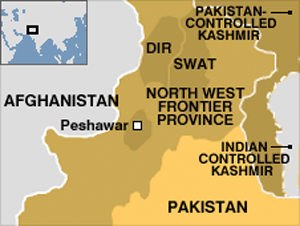Fighting in Pakistan’s Swat Valley
(Image: bbc.co.uk)
The fighting in Pakistan’s Swat Valley is well into its second week. Pakistan’s military says it’s killed more than a thousand Islamic militants. But here’s a figure that’s both more reliable and more difficult to comprehend. One and a half million Pakistanis have fled the fighting. Many are living in squalid tent cities.
Secretary of State Hilary Clinton said today that help is on the way: "Today, I am announcing that the people of the United States are responding to a request for assistance from the government of Pakistan with more than $100 million in humanitarian support."
The aid package is part of the Obama Administration’s strategy for countering the appeal of the Taliban in Pakistan. The BBC’s Haroon Rashid has been traveling in the region. He’s now back in Islamabad.
Rashid describes what he saw in the conflicted region: "I was in Bunir and I went up to the District headquarters, the main town which wore a deserted look because you look at people who told me there that 80% of the population has already left for a safe place or for internally displaced people, camps set up in different districts. So all in all, I saw also marks of destruction, vehicles destroyed, fueling stations and burned down, which proved that until a few days back this was a battle ground between the Taliban and the Pakistani military."
But he did not see signs that extremists or the Taliban were still in the area: "No, no sign of any militant in that region where I happened to travel around. There was Pakistani military in complete control of that region; but only a few policemen I could see, and the reason is that the police force in that region is extremely demoralized … because of special targeted attacks on them from Pakistan Taliban in the last few months."
Some analysts have felt that Bunir is actually under the control of the Taliban, but according to Rashid: "The Pakistani military itself is claiming that they have mostly cleared Bunir of Taliban and the Pakistani parties are now asking IDBs to return to their home; but when I was there I didn’t see many of those internally displaced families going back. Yes, I did see a lot of men going back but mostly to look after the homes that they had left behind in haste and their cattle or to harvest the wheat, which is fully grown and needs to be harvested in the next week or ten days. Otherwise, that whole crop will be useless."
He says most of the people in the area have fled, "To different districts in neighboring Bunir, basically Swavi and Mardan where the Pakistani authorities have set up around seventeen camps."
The United Nations High Commission for Refugees has said this flood of people has taken them completely by surprise. By some accounts, as much as one and a half million people have been displaced.
Rashid explains what these numbers mean for conditions in the camps: "I mean, the government and different welfare and non-governmental organizations are trying their best to cope with the influx but the numbers are still rising, and I think the government did not plan such a large number of displacement in the initial phase. So when this flood came in, they were just engulfed and they couldn’t do much about it, but conditions … are quite difficult in these camps. For one, the weather is very hard these days and a mere tent cannot keep the scorching sun away from these unfortunate people. And then the ground gets so hard, the mud there gets so baked that one of the officials providing relief to these refugees told me that these refugees are simply being cooked in those camps.
"The hygienic conditions at these camps is not good and as I was traveling out of Bunir into Mardan District, there was this strong dust storm. In such conditions the gastroenteritis problems, stomach problems, diarrhea, skin burns and dehydration are most of the problems that these people face plus malaria because of mosquitoes spread in that region is another problem that they all have to cope with at the moment."
PRI’s "The World" is a one-hour, weekday radio news magazine offering a mix of news, features, interviews, and music from around the globe. "The World" is a co-production of the BBC World Service, PRI and WGBH Boston.
